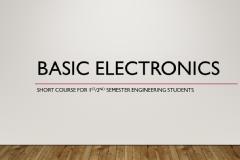A Chemical Engineering class is a fundamental course within a chemical engineering curriculum. It covers a wide range of topics related to the principles and applications of chemical engineering. The specific content may vary depending on the institution and the level of the course (introductory, intermediate, or advanced), but here are some common topics that students typically learn in a Chemical Engineering class:
-
Introduction to Chemical Engineering:
- Overview of the field of chemical engineering, its history, and its role in various industries.
-
Material and Energy Balances:
- Principles of conservation of mass and energy applied to chemical processes.
- Calculations involving material balances and energy balances.
-
Fluid Mechanics:
- Study of fluid behavior, including properties of fluids, fluid statics, and fluid dynamics.
- Applications to flow in pipelines, pumps, and equipment.
-
Heat Transfer:
- Understanding heat transfer mechanisms (conduction, convection, radiation).
- Applications in heat exchangers and other equipment.
-
Mass Transfer:
- Study of mass transfer processes, including diffusion and convection.
- Applications in separation processes like distillation and absorption.
-
Chemical Thermodynamics:
- Fundamentals of thermodynamics applied to chemical processes.
- Analysis of phase equilibria and chemical reactions.
-
Chemical Kinetics:
- Study of reaction rates and mechanisms.
- Application to reaction engineering and reactor design.
-
Transport Phenomena:
- Integration of fluid mechanics, heat transfer, and mass transfer principles in chemical processes.
-
Process Control:
- Introduction to control theory and principles of process control.
- Use of control systems in chemical processes.
-
Chemical Engineering Unit Operations:
- Detailed study of unit operations such as distillation, absorption, extraction, crystallization, and filtration.
-
Chemical Engineering Equipment Design:
- Design principles and calculations for various chemical engineering equipment, including reactors, heat exchangers, and separators.
-
Safety and Environmental Engineering:
- Introduction to safety protocols, risk assessment, and environmental regulations relevant to chemical processes.
-
Economic Analysis:
- Basics of cost estimation, profitability analysis, and economic evaluation of chemical processes.
-
Process Simulation and Modeling:
- Introduction to software tools for process simulation and modeling.
- Hands-on experience in using simulation software.
-
Case Studies and Projects:
- Real-world case studies and projects that require students to apply their knowledge to practical engineering problems.
-
Ethics and Professional Responsibility:
- Discussions on ethical considerations and professional responsibilities in the field of chemical engineering.
-
Environmental and Sustainability Aspects:
- Consideration of environmental and sustainability aspects in designing and operating chemical processes.
These topics provide a comprehensive foundation in chemical engineering principles and prepare students for more advanced coursework and practical applications in various industries, including petrochemicals, pharmaceuticals, energy, materials, and more. The emphasis may vary depending on the specific course and the institution's curriculum.






